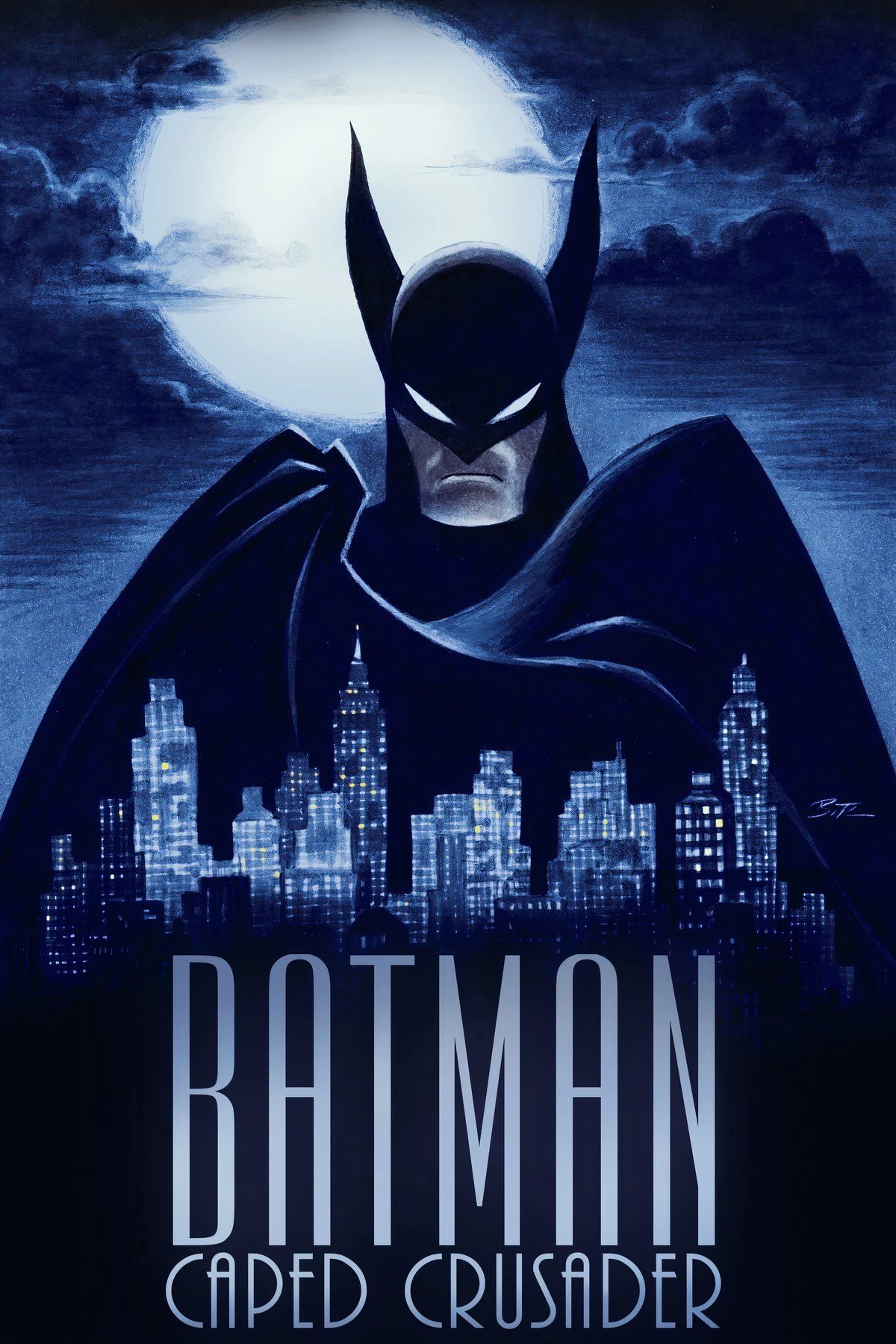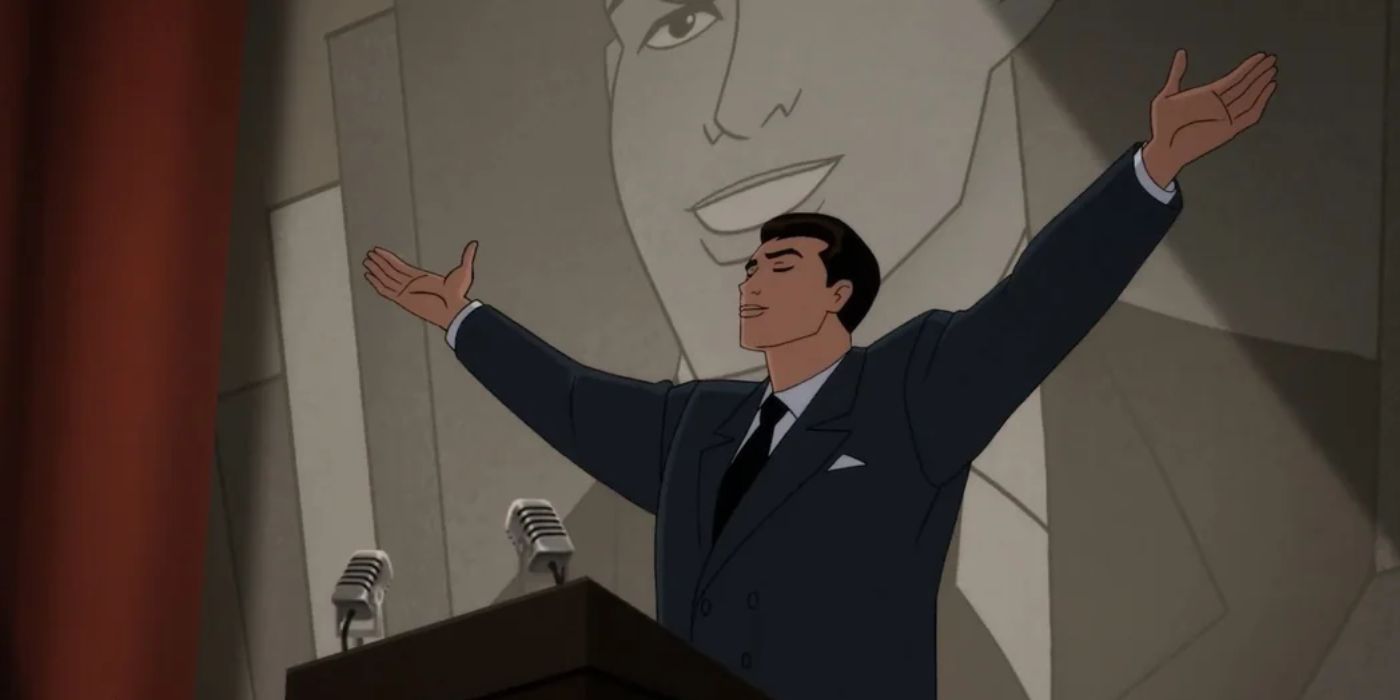Editor’s Note: The following contains spoilers for ‘Batman: Caped Crusader’.
The Big Picture
- “Batman: Caped Crusader” reimagines Harvey Dent’s character, portraying him as morally gray from the start, choosing a noble path in the end.
- Dent’s transformation from Harvey Dent to Two-Face is averted in the series, with Dent ultimately sacrificing himself as a martyr for justice.
- The animated series delves into Dent’s complex motivations, showcasing a nuanced portrayal of the character struggling with duality and moral grayness.
Helmed by Bruce Timm, Batman: Caped Crusader reinvents the familiar world of the Dark Knight. The latest Batman animated series on Prime Video introduces familiar characters such as Barbara Gordan (Krystal Joy Brown), Catwoman (Christina Ricci), and Clayface (Dan Donohue), with much of the inspiration coming from Batman’s Golden Age comics. Extending a noir-inspired reimagining of the DC character, Batman: Caped Crusader comes with its own set of little twists and surprises. However, the changes made to Harvey Dent (Diedrich Bader) become the most interesting of the lot, as the character refuses to follow the classic character arc of a virtuous man brought down by the corruption residing within Gotham. Instead, Harvey Dent in Batman: Caped Crusader turns out to be a product of the city rather than the shining beacon of justice the character is portrayed to be before his transformation into the villainous Two-Face.

Batman: Caped Crusader (2024)
In Gotham City, where corruption and crime are rampant, wealthy socialite Bruce Wayne transforms into Batman following a personal tragedy. His relentless pursuit of justice attracts unexpected allies within the GCPD and City Hall, but also spawns deadly consequences. This series reimagines Batman’s mythology through the creative lenses of J.J. Abrams, Matt Reeves, and Bruce Timm.
- Release Date
- August 1, 2024
- Creator
- Bob Kane, Bruce Timm
- Seasons
- 1
- Franchise(s)
- Batman
‘Batman: Caped Crusader’ Flips Harvey Dent’s Character
In the classic origin story of Two-Face, Harvey Dent is touted to be the “White Knight” of Gotham who swore to reform the city, getting rid of the rot in the heart of Gotham, much like Batman. Despite hardships early in his life, Dent worked his way to the District Attorney’s office. Ultimately, Dent’s affection for genuine justice leads him to become one of Batman’s early allies, as he joins hands with Commissioner Gordon and Batman to take down the crime syndicate of Carmine Falcone.
Unfortunately, Dent fails to fulfill his destiny. Falcone’s calculated moves result in mob boss Salvatore Maroni believing that Dent was responsible for the death of his father. In an act of revenge, Maroni pours acid on Dent, permanently disfiguring one half of his face and, ultimately, paving the way for Dent’s transformation into the Batman rogue Two-Face. Unlike other portrayals of Harvey Dent (including that in Christopher Nolan’s The Dark Knight), Batman: Caped Crusader’s Harvey Dent can be seen following a significantly morally gray path right from the beginning.
Harvey Dent Is Beyond Saving in This Animated Series
In the first scene itself, Harvey Dent and his motivation in life are established quite clearly in the new animated series. Just after a court hearing, Barbara Gordon confronts Dent for trying to convict a young, innocent boy. However, Dent seems to only be interested in getting a conviction in an attempt to get another advertisement for his mayoral campaign. In stark contrast to the moral compass of other versions of Harvey Dent, Batman: Caped Crusader’s Harvey Dent’s moral compass is tainted by his selfish motives. Yes, even though Dent is still motivated by his serious urge to reform the system, it becomes difficult to gauge if his motivations are not entirely self-serving from the beginning, propelled by his desire to usurp Mayor Jessop’s chair (William Salyers).
Unlike other portrayals of the character that depict Dent becoming morally corrupted after the acid attack on him and his fight with Two-Face that resides within him, Batman: Caped Crusader follows Dent walking a very thin line where the duality in his actions and motivations are evident from the beginning. Even in the first scene, Dent is willing to bet the fate of a boy on trial using a coin flip – something Two-Face is famously known for doing before committing his crimes.
In the comics, Two-Face always flips a coin and the result dictates his actions, deciding whether he will commit a crime or not. The coin represents the two-sided morality shared by the character by virtue of the shared existence of Harvey Dent and Two-Face within the same man. However, in the comics, the coin comes into the picture only once Dent transforms into Two-Face. In Batman: Caped Crusader, Harvey Dent seems to share the corrupted moral compass of his villainous comic book alter ego even without going through the incident that brings Two-Face into existence.

Related
‘Batman: Caped Crusader’: What You Need To Know About Matt Reeves and Bruce Timm’s Batman Reboot
Shine the Bat-Signal – it’s nearly time for the Dark Knight’s return.
Harvey Dent Wins Over Two-Face in ‘Batman: Caped Crusader’
The fear of losing the Mayoral election compels Dent to make a deal with Rupert Thorne. But continuing to feed the duality of his moral disposition, Dent refuses to honor the deal with Thorne, forcing Thorne to send his henchman Tony Zito (Vincent Piazza) to settle the score. Zito, acting on Thorne’s orders, throws acid at Dent’s face, scarring half of Dent’s face. After the attack, not only does Dent gets out of the Mayoral race, but he also starts becoming insecure about his identity. The attack on him results in Dent contemplating his past choices and his own contribution to the system that he played an equal part in corrupting. Although he agrees to testify against Thorne and other criminals in Gotham on Barbara Gordon’s insistence, Dent continues to tussle between his identity as Harvey Dent and Two-Face. In the end, the character does not transform into Two-Face as he ends up choosing a much nobler path. Finally, in what is almost a Shakespearean climax, Harvey Dent becomes an anti-hero, sacrificing himself to save Barbara from the corrupt cop Arnold Flass’ bullet (Gary Anthony Williams). Eventually, Harvey Dent dies as Harvey Dent, not ever fulfilling his destiny as Two-Face.
In Batman: Caped Crusader, Dent chooses to die a hero’s death, instead of letting Gotham consume him. By choosing to show the character morally gray from the start, the story provides Dent an opportunity to face dire consequences of his own making. He is not an unfortunate man who was driven down a path of madness by the ever-consuming chaos that fills Gotham. Unlike other Batman stories, Batman: Caped Crusader does not allow Harvey Dent to become a symbol of the affliction that troubles Gotham. Instead, this time, Harvey Dent and his choices, preceding his death in the finale, allow the character to become a martyr for the cause he once believed in. It’s natural that Harvey Dent’s death in the finale forces Batman (Hamish Linklater) to revisit his choices. While Batman is seen battling smaller criminals throughout the series, Dent’s death becomes the turning point for Batman to realize that it’s time he goes hunting for the big fish — Rupert Thorne — if he wishes to save Gotham. In other words, Dent indirectly saved Gotham by sacrificing himself.
Batman: Caped Crusader is available to stream on Prime Video in the U.S.
Watch on Prime Video

